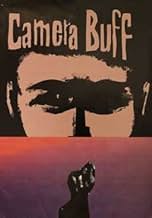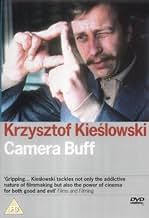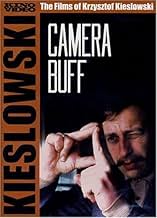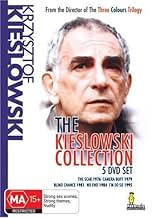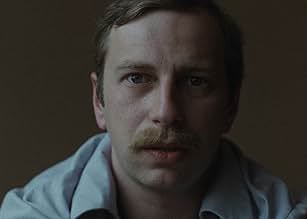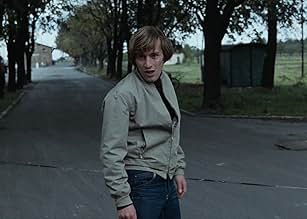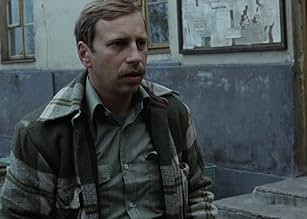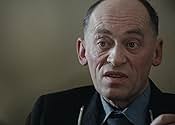NOTE IMDb
7,8/10
8,9 k
MA NOTE
Un simple ouvrier d'usine achète un appareil photo à l'occasion de la naissance de son enfant. Les autorités lui ordonnent de réaliser des documentaires sur le succès de l'usine.Un simple ouvrier d'usine achète un appareil photo à l'occasion de la naissance de son enfant. Les autorités lui ordonnent de réaliser des documentaires sur le succès de l'usine.Un simple ouvrier d'usine achète un appareil photo à l'occasion de la naissance de son enfant. Les autorités lui ordonnent de réaliser des documentaires sur le succès de l'usine.
- Réalisation
- Scénario
- Casting principal
- Récompenses
- 6 victoires au total
Avis à la une
Krzyszof Kieslowksi begun his career as a documentary film-maker. From the start, he seemed to know two things: that in the shabby, feudal bureaucracy that was communist Poland, everything was political; and that the camera is never truly neutral. It was the second concern that saw him shift into telling fictional, constructed stories; while the first, and his own struggles as a young director, inspired the subject of 'Camera Buff', his first feature. As well as its immediate subject, the film is also a fascinating portrayal of an unfashionable subject, namely the class system, alive and well in the supposed socialist utopia (Kieslowski was a great admirer of Ken Loach, so perhaps we should not be too surprised). The film starts as a black comedy in the manner of the tenth part of his later 'Dekalog', and is both very funny and immediately true to life; as it progresses, it becomes more serious but there isn't quite the emotional intensity that marks his greatest works. The score is also less remarkable than those in the films he made with Zbigniew Priesner, his permanent collaborator from the mid 1980s. But his skill at composing images that are simultaneously profoundly ordinary and starkly arresting is very much in evidence, as is the characteristic sense of an all-pervasive greyness in the lives of his characters, punctured only by shafts of colour when his hapless hero comes into contact with the affluent metropolitan elite. In Dennis Potter's 'The Singing Detective', a central theme is the way that the artist will stop at nothing in using their own life as material, and this is also a theme here, growing in importance as the movie progresses. It's an unusual subject for a debut, and can perhaps be seen as Kieslowski laying his cards on the table before he begun the game. Greatness lay just around the corner.
A Model of the Man as a Young Artist
One of the best things in the world is to take someone you love deeply and trace them back in their histories, back back before you knew them. Back until you see all the butterflies that nudged each other to produce what you need and feed.
And before the shape was mature. Yes, then you can see the structure, the limbs before they flowered and even surprise yourself a bit.
I'm in love with Kieslowski. Oh he isn't my favorite filmmaker, and not the one I spend time with when I need to learn and grow. But he is someone to have tea with, a friend who has his own way of fluffing air with apparent lovely slight fogs but when you encounter them you find them informed, nourishing, psychotropic. More than lovely. "Heaven," though not all his, is something I wish on every soul and every vehicle he had driven until then carried him there.
This is Kielsowski's first feature. It was before he entered into that odd writing partnership where some external force (Piesiewicz) created some sort of conventional frame on which our artistlover could drape his folds, lace and knives. Before that clever partnership that hid the mechanics.
Here you can see his favored machine, the simple fold: a movie about movie-making and love, and all the related dimensions he knew at the time: intellectual, death, rutting, wistfulness, justice. Passions all. Urges all. At the end, it loops upon itself, the ladder complete to start again at the beginning of the next.
It isn't particularly profound or satisfying by itself. But if you are a lucid mind today, chances are you think about narrative flows and how you and the world use them to wind around and buffet each other. And almost certainly you have had tea with Kieslowski.
If so, you'll find this model of his younger self will tell you something about yourself in an odd, indirectly magical way. If you do, check out the trigger for passion here: Chopin.
Ted's Evaluation -- 3 of 3: Worth watching.
One of the best things in the world is to take someone you love deeply and trace them back in their histories, back back before you knew them. Back until you see all the butterflies that nudged each other to produce what you need and feed.
And before the shape was mature. Yes, then you can see the structure, the limbs before they flowered and even surprise yourself a bit.
I'm in love with Kieslowski. Oh he isn't my favorite filmmaker, and not the one I spend time with when I need to learn and grow. But he is someone to have tea with, a friend who has his own way of fluffing air with apparent lovely slight fogs but when you encounter them you find them informed, nourishing, psychotropic. More than lovely. "Heaven," though not all his, is something I wish on every soul and every vehicle he had driven until then carried him there.
This is Kielsowski's first feature. It was before he entered into that odd writing partnership where some external force (Piesiewicz) created some sort of conventional frame on which our artistlover could drape his folds, lace and knives. Before that clever partnership that hid the mechanics.
Here you can see his favored machine, the simple fold: a movie about movie-making and love, and all the related dimensions he knew at the time: intellectual, death, rutting, wistfulness, justice. Passions all. Urges all. At the end, it loops upon itself, the ladder complete to start again at the beginning of the next.
It isn't particularly profound or satisfying by itself. But if you are a lucid mind today, chances are you think about narrative flows and how you and the world use them to wind around and buffet each other. And almost certainly you have had tea with Kieslowski.
If so, you'll find this model of his younger self will tell you something about yourself in an odd, indirectly magical way. If you do, check out the trigger for passion here: Chopin.
Ted's Evaluation -- 3 of 3: Worth watching.
Ah for the love of film
In 2006, I was one internet flight ticket transaction click away from moving to the area of Poland for the duration, but didn't. The "good" reason being is that I suffered some seriously grave trepidation over the fact that I would need to have two months salary in the bank before I'd EVER raise enough capital to buy an 8 mm motion picture camera. And this was in 2006. Sadly, these hypertensive concerns about finances low, all sleepless nights over equipment I don't have, and from where in the heck is the next camera going to come turned out to be relative in the scope of things in a sick and cyclical sense- and after interfacing with the characters of Kyrstof Kieslowski's incredibly moving Humanist Dark-Dramity, Camera Buff, for an hour and half, I'm just now harboring more than a few serious regrets about not actually abandoning the competitive, spiraling nightmare that is Western Life when I had the chance.
Camera Buff is a wonderful story about a factory worker Filip (Jerzy Stuhr); a man who, in his thirties, begins to see life anew through the view finder of a small gauge movie camera. Originally purchased for "two months salary," which "pissed his wife off" to document his newborn daughter's first few steps, the 8 mm camera is quickly realized as something more useful than just a device for making home-movies. The narrative's tension is organized specifically around the reaction to the films of the institutional power structures and forces around Filip that essentially commissioned, financed, and instigated the films themselves along with Filip's newly discovered and unyielding passion for creating them as he sees fit.
If you view the Kino Video DVD release of this film, perhaps even more profoundly affecting than the feature as an augury of hope for the human race is the sixteen minute black and white documentary entitled Talking Heads in which Kielowski conducts helter-skleter a multitude of fifteen second interviews about "who you are" and "what you want" with Polish citizens, age zero to one-hundred, across all walks of life starting at the year 1979 with a little gurgling baby. In all, it's wonderful material and has me seeking out more Kieslowski.
Camera Buff is a wonderful story about a factory worker Filip (Jerzy Stuhr); a man who, in his thirties, begins to see life anew through the view finder of a small gauge movie camera. Originally purchased for "two months salary," which "pissed his wife off" to document his newborn daughter's first few steps, the 8 mm camera is quickly realized as something more useful than just a device for making home-movies. The narrative's tension is organized specifically around the reaction to the films of the institutional power structures and forces around Filip that essentially commissioned, financed, and instigated the films themselves along with Filip's newly discovered and unyielding passion for creating them as he sees fit.
If you view the Kino Video DVD release of this film, perhaps even more profoundly affecting than the feature as an augury of hope for the human race is the sixteen minute black and white documentary entitled Talking Heads in which Kielowski conducts helter-skleter a multitude of fifteen second interviews about "who you are" and "what you want" with Polish citizens, age zero to one-hundred, across all walks of life starting at the year 1979 with a little gurgling baby. In all, it's wonderful material and has me seeking out more Kieslowski.
Haven't seen every Kieslowski work yet (though as of now it's close), but of what has been seen all ranges between very good (the 8th episode of 'Dekalog') to masterpiece ('Three Colors: Red' and 'Blue' and the whole 'Dekalog' series). To me, he was an immensely gifted director, who died far too early.
An early effort, 'Camera Buff' is not among Kieslowski's best work, but generally it is deserving of more love. Although Kieslowski's directing style is fairly well established, remarkable for so early on, it did become more refined later on as seen with his late 80s-early 90s work. There is a preference for the more intricate-sounding music scores of his later work, this score was the kind that worked well within the film but one doesn't have the desire to hear it on its own repeatedly, and the slightly more emotional resonant and intense work like the best of the 'Dekalog' series, 'The Double Life of Veronique' and 'Three Colors: Red' and 'Blue'.
Despite how that sounds, there's actually not much wrong at all with 'Camera Buff', just that it was done better later. This said, 'Camera Buff' is a great film, regardless of what stage it was made in Kieslowski's career.
'Camera Buff', as was always the case in Kieslowski's work, is very well made. The cinematography is minimalist, but visually striking and atmospheric as well as fascinatingly personal. As well as being beautifully shot with atmospheric use of colour to match the mood, it is gritty yet beautiful with many thoughtful and emotionally powerful images lingering long into the memory. Kieslowski's direction is quietly unobtrusive, intelligently paced and never too heavy.
It's a thought-provoking film in writing, as ever thematically rich and with complex characters, the shift from initial comedy to drama expertly done rather than abrupt and jarring. Kieslowski again proves himself as a master of narrative construction, and the whole film is thoroughly engaging and suitably challenging. The acting is as always from Kieslowski marvellously nuanced and natural.
To conclude, early Kieslowski that while not one of his best is deserving of more love. 9/10 Bethany Cox
An early effort, 'Camera Buff' is not among Kieslowski's best work, but generally it is deserving of more love. Although Kieslowski's directing style is fairly well established, remarkable for so early on, it did become more refined later on as seen with his late 80s-early 90s work. There is a preference for the more intricate-sounding music scores of his later work, this score was the kind that worked well within the film but one doesn't have the desire to hear it on its own repeatedly, and the slightly more emotional resonant and intense work like the best of the 'Dekalog' series, 'The Double Life of Veronique' and 'Three Colors: Red' and 'Blue'.
Despite how that sounds, there's actually not much wrong at all with 'Camera Buff', just that it was done better later. This said, 'Camera Buff' is a great film, regardless of what stage it was made in Kieslowski's career.
'Camera Buff', as was always the case in Kieslowski's work, is very well made. The cinematography is minimalist, but visually striking and atmospheric as well as fascinatingly personal. As well as being beautifully shot with atmospheric use of colour to match the mood, it is gritty yet beautiful with many thoughtful and emotionally powerful images lingering long into the memory. Kieslowski's direction is quietly unobtrusive, intelligently paced and never too heavy.
It's a thought-provoking film in writing, as ever thematically rich and with complex characters, the shift from initial comedy to drama expertly done rather than abrupt and jarring. Kieslowski again proves himself as a master of narrative construction, and the whole film is thoroughly engaging and suitably challenging. The acting is as always from Kieslowski marvellously nuanced and natural.
To conclude, early Kieslowski that while not one of his best is deserving of more love. 9/10 Bethany Cox
Filip buys an eight-millimeter movie camera when his first child is born. Because it's the first camera in town, he's named official photographer by the local Party boss. His horizons widen when he is sent to regional film festivals with his first works but his focus on movie-making also leads to domestic strife and philosophical dilemmas.
"Camera Buff" explores censorship in Communist Poland and its repression of the individual's expression of his observations. Filip also confronts the consequences of a man who discovers new possibilities and finds his former world, which had been so fulfilling before he'd discovered filmmaking, rendered dull, old, and limited.
The story is interesting solely because of the Communist aspect. If it was just a story of man who becomes obsessed with making movies, it would be just another story about movies told in the form of a movie. But the Communist aspect? If one man in town has a camera, it suddenly becomes a tool for the entire city. It's interesting. This could be beautiful or ugly, depending on who happens to be in power.
"Camera Buff" explores censorship in Communist Poland and its repression of the individual's expression of his observations. Filip also confronts the consequences of a man who discovers new possibilities and finds his former world, which had been so fulfilling before he'd discovered filmmaking, rendered dull, old, and limited.
The story is interesting solely because of the Communist aspect. If it was just a story of man who becomes obsessed with making movies, it would be just another story about movies told in the form of a movie. But the Communist aspect? If one man in town has a camera, it suddenly becomes a tool for the entire city. It's interesting. This could be beautiful or ugly, depending on who happens to be in power.
Le saviez-vous
- AnecdotesThe film's opening scene and Irka's nightmare about a hawk killing a chicken are reminiscent of Ken Loach's Kes (1969) -- a film about a boy who takes to training a wild kestrel in order to escape his troubled life. Later, Filip can be seen reading a filmmaking text and turning to a section about Ken Loach and Kes (1969). This reference is twofold. First, Filip is clearly inspired by filmmakers like Loach in making social realist films about working-class people. Second, Irka is tormented by images mirroring Kes (1969) which represent her husband's budding obsession with this type of filmmaking.
- Citations
Piotrek Krawczyk: [looking at a roll of motion picture film] It's beautiful what you guys do. A person's no longer alive, yet she's still here. It's beautiful.
- ConnexionsFeatured in Fejezetek a film történetéböl: A lengyel film (1990)
Meilleurs choix
Connectez-vous pour évaluer et suivre la liste de favoris afin de recevoir des recommandations personnalisées
- How long is Camera Buff?Alimenté par Alexa
Détails
Contribuer à cette page
Suggérer une modification ou ajouter du contenu manquant


